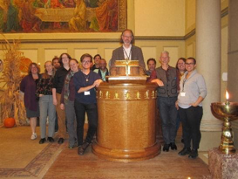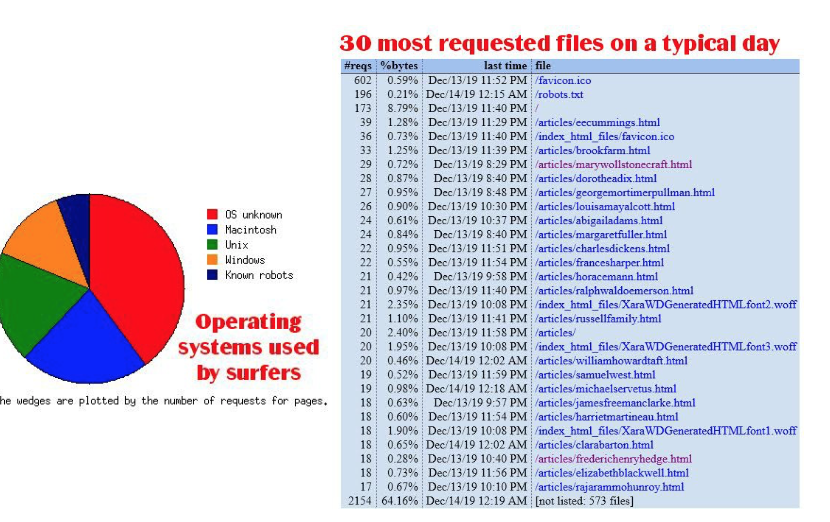What’s In This Issue
- How is the DUUB Doing?
- President’s Post
- The 2019 Convocation of UU Studies
How is the DUUB Doing?
by Jim Nugent
How useful is the Dictionary of Unitarian Universalist Biography (the DUUB)? How do web surfers find the DUUB? What biographies are the most popular? And who uses it? Fortunately, there are a number of ways to measure and evaluate web traffic that lands at uudb.org. The first and most basic method is to consult the user stats on our Internet server. Those stats tell us how many times a day web surfers request pages and images from the DUUB. In addition the stats keep a count of the operating system, browser version, and general location of those surfers. Keeping track of Google searches that lead to the DUUB is a second useful metric.
The DUUB has been available on the Internet since 1999. The user stats from the DUUB server tell us that people download about 3,700 pages a day from the DUUB server to their local browsers. These downloaded pages are like books checked out of the library, readers have borrowed them and taken them home but we have no idea if they read them or find them useful. On the other hand, 3,700 users a day adds up to over a million page downloads a year.
A second view of our DUUB web traffic is provided by the Google Search Console. It tells us which words and phrases web surfers are Googling and which of our pages are consulted. Data from our server is comprehensive, everybody is counted: Google Search Console data, on the other hand, only tracks people who find the DUUB using that search engine. Google doesn’t capture folks who use other search engines like Bing, Baidu, or DuckDuckGo and Google has no way of counting folk who access the DUUB from a bookmark, from a link on another website, or by just typing uudb.org into their browser search box.
The Google Search Console stats provides detailed information on about one in ten of the daily 3,700 surfers who download a DUUB web page. As a search engine Google counts how many times people search on various words and phrases. Google displays search results, usually ten to a page, and it then tracks which results people click on most often. The pages clicked most often move toward the top of Google’s search ranking. Of the 259 people who did a Google search for “Unitarian Controversy,” 122 clicked on and loaded our DUUB page on the controversy. So in this instance the DUUB page is listed first in Google search results. (Read more below)

President’s Post
What a wonderful Convocation we had in Baltimore in October! Great thanks to all the organizers, speakers, and hosts. Look for some of the presentations in the next Journal of UU History. Others will be online. One bonus of gathering face-to-face was finding new volunteers to help with our online presence and communications.
Recently I have begun the first of several speaking tours in conjunction with my new book on the Transcendentalists as social activists. It was gratifying to see so many people realizing how relevant our history is to the present moment.
Among other things, I am collecting the names and contact information for local UU historians and archivists. Many seemed to be unaware of the existence of our UU History and Heritage Society. This is a pity, since there are many ways that we can help them in their research and efforts to educate their fellow congregants, and they can help us.
The next issue of Journal, for example, will also offer a number of accounts of how UU congregations are revisiting their history with a deepened sense of past injustice — toward indigenous people, and through sins both of commission and omission in regard to slavery and racial justice. All show how it is possible to look back as an important part of moving forward.
The new editor of the online Dictionary of UU Biography (www.uudb.org) is the Rev. Connie Simon of First Unitarian in Cincinnati. As a woman of color and a member of the great team we now have on the UUHHS board, Connie is eager to do three things: broaden the range of individuals included; get more of us researching and writing biographies; and get help in updating some entries where new scholarship has uncovered new information and/or where new books should be added to the bibliography.
With the completion of my Transcendentalist project, I have turned to researching the history of my own congregation, First UU Society of San Francisco. I’m glad to give tips to other congregational historians on research methods and resources. Some of what I have found already is fascinating.
For example, it seems that what is now UUSF touched the lives of significant political leaders not only in the 19th century, when Thomas Starr King preached to two successive California governors, Leland Stanford and Frederick Low (who helped him in the successful effort to preserve Yosemite). It also did so in the 20th century. A new book by Miriam Pawel, The Browns of California, reveals that the mother of Governor Pat Brown and the grandmother of Jerry, Ida Schuckman Brown, although she had agreed to raise her children in her husband’s Irish Catholic faith, was the real moral center of the family — and a staunch member of the Unitarian Church, even teaching Sunday School, for over fifty years.
She inspired two more governors to public service. This shows that we often have great Influence, even beyond our own membership, and even in times when our churches may struggle, as the San Francisco church surely did during the Great Depression and World War II, when Ida was most active.
So do send me more names of congregational historians and archivists. Promote membership in this Society. Donate some research or writing time on a biography. Tell us what you are working on or interested in. We’ll do our best to both support you and engage you.
Yours in shared love of our history,
John Buehrens Jbuehrens@nullcomcast.net
President, UUHHS
Returning to the Source:
The 2019 Convocation of UU Studies
By Kathy Parker & Convocation Planning Team
In October 2019, nearly 90 UUs gathered at the Maritime Conference Center near Baltimore to share their research in commemoration of the 200th anniversary of William Ellery Channing’s 1819 sermon on Unitarian Christianity and the 250th anniversary of John Murray’s arrival in North America. In four days, we heard intriguing and inspiring presentations from our Keynote Speakers, Christopher Cameron and Mark Harris, whose first two lectures will appear in our spring 2020 issue of the Journal of UU History: “Bringingup the Bodies” and “Liberal Religion and Abolitionism.” We also heard a provocative lecture on contemporary perceptions of Channing’s sermon by Dan McKanan, delivered from the Channing pulpit to a packed audience at the First Unitarian Church of Baltimore. This will also appear in our next journal.

Numerous other papers were presented by conference attendees on such topics of interest as George Pullman, William Sullivan, Emily Cogswell and other women who ministered in some way in western states, and the origins of Unitarianism and Universalism in New
Orleans. You will see selections of these lectures and papers published in the spring 2020 journal or on the Convo website (2019 Convo.org).
Some Convo participants came early for a trip to the National Museum of African American History and Culture in Wash., DC; others traveled afterward to the Murray Grove Retreat and Renewal Center. Also, a very special part of this conference was the presence of many seminary students, made possible with the help of scholarship funds from the UU Funding Program, Collegium, and UUHHS.
Conferences bring excitement over what can be learned and what relationships can be fostered among UU clergy, scholars, seminarians, and others. One post-conference evaluation reported: “I learned so much, and in such terrific detail, with tremendous visuals – can’t wait to share with colleagues, my church, and whomever is interested!” Another reported: “This was unlike any other UU opportunity I’ve had so far. I really appreciated it.”
There was some need for improvement, of course – the expense and size of a conference like this can be a problem – and the logistics of the facility did not work as well as we hoped for everyone. Reports of these issues will be considered for the next Convo – in 2022!
Be watching for the spring 2020 issue of our Journal of UU History, in which you will learn more about the Convo and be able to read some of the very fine papers. We hope you will especially appreciate this if you were unable to join us at the event.
How is the DUUB Doing? (Continued)
The Google Search Console data for DUUB pages can is interesting for a number of reasons. Lots of people do Google searches on Dorothea Dix, Kurt Vonnegut, Charles Dickens, and Horatio Alger but they seldom click on—or load—those DUUB pages when they are presented in Google search results. Why? Because there are so many other sources and types of information on the web that cover those famous people. Our biographies of lesser known UUs such as Samuel Barrett, Joseph Jordan, Peter Gonesius, Florence Buck, the Ballou Family, or Maria Cook tend to place high in search result rankings and they tend to be used at higher rates. Ten percent of the 1,500 people searching on Joseph Jordan clicked on and loaded his DUUB biography to their browser last year.
Google also provides information on which websites link to DUUB biographies. This is a measure of institutional support. Wikipedia has at least 327 links to DUUB pages while the UUA has 358, and the UUWorld has 106. In addition many blogs provide links to the DUUB as do UU church websites, sermon collections, and general biography sites. The Google Search Console lists 1,001 websites that provide their viewers with over 12,000 links to DUUB biographies.
So, the DUUB is an often used resource for our own historians, ministers, and congregants. In addition it is valuable outreach since it is used by people around the world. Those 3,700 page views a day add up to 1.3 million page views per year. Outreach worthy of our continued support.

HAVE AN INTERESTING HISTORIC UU FIND THAT YOU WANT TO SHARE WITH UUHHS?
Please send any submissions about your local UU history and heritage to the UUHHS newsletter!
Send all submissions to newsletter editor, Phoebe Cos at phoebekates16@nullgmail.com by April 1st. We look forward to hearing your stories!
Unitarian Universalist History and Heritage Society Board 2019-2020
- John Buehrens, President
- Nicole Kirk, Vice President
- Dan McKanan, Secretary
- Rali Weaver, Treasurer
- Kathleen Parker, Journal Editor ex officio
- Earl Holt, ex officio
- Phoebe Cos, Newsletter Editor
- Patrice Curtis, Board Member
- Mark Hicks, Board Member
- Gail Forsyth-Vail, Board Member
- Joshua Leach, Board Member
- Connie Simon, Board Member
- Tisa Wenger, Board Member